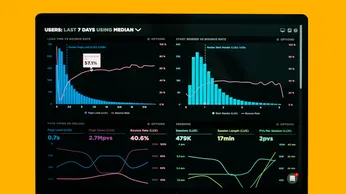On this page
In today’s rapidly evolving automotive industry, trust and transparency aren't just buzzwords, they're business imperatives. With the rise of electric vehicles, shared mobility, and digitally savvy buyers, traditional sales models are under pressure. McKinsey & Company forecasts that these trends could shrink annual auto sales growth from 3.6% to just 2% by 2030.
As tighter margins become the norm and buyer expectations shift, operational efficiency, especially in how commissions are tracked and managed through sales commission tracking software, has become critical to sustaining performance and building long-term customer confidence.
Layered sales teams, high-value transactions, and dispersed dealer networks demand transparent, real-time, and scalable commission systems. Yet many automotive businesses still rely on outdated, opaque processes that lead to confusion, delays, and mistrust among sales reps.
As the U.S. auto market prepares for a rebound in 2025, it’s clear that sales commission tracking software will be key to driving growth and keeping teams motivated.
Let’s dive into how Xoxoday Compass addresses these challenges and helps future-proof sales commission automation for the automotive industry.
What are the Challenges in Traditional Commission Management for the Auto Industry?
-
Opacity in commission calculation
Many sales representatives are unaware of how their commissions are computed, especially when dealing with intricate structures involving multiple variables like vehicle models, financing options, and regional incentives. This lack of clarity can lead to dissatisfaction and reduced motivation.
-
Delayed commission payouts
Manual processes often result in delays in commission disbursements. Such delays can strain the relationship between sales teams and management, affecting overall morale and productivity.
-
High administrative overhead
Calculating commissions manually is time-consuming and prone to errors. Finance and HR departments spend significant resources reconciling discrepancies, which could be better utilized elsewhere.
-
Difficulty in adapting to market changes
The automotive market is dynamic, with frequent changes in pricing, promotions, and product offerings. Traditional sales commission tracking systems struggle to adapt quickly to these changes, leading to outdated or misaligned incentive structures.
How does sales commission automation save the day for the auto industry?
Automating the commission process addresses these challenges by providing a transparent, efficient, and adaptable system. As per industry experts, automation ensures that sales teams have real-time access to their performance metrics and expected earnings, fostering trust and motivation.
Automotive sales commission automation delivers more than just operational convenience—it drives trust, performance, and compliance at scale. Here are the core benefits and capabilities that make automation a strategic asset:
-
Enhanced transparency and accuracy
Automated systems offer clear, real-time status of commission payouts, helping sales representatives understand exactly their earnings. This visibility reduces confusion and builds trust, while minimizing errors and disputes that often arise from manual processes.
-
Timely and reliable payouts
Automation significantly speeds up the commission processes, ensuring smooth payouts. This consistency helps maintain morale and retention across sales teams, especially in high-stakes environments like automotive sales.
-
Scalability and flexibility
Sales Commission tracking software can easily adapt to changes in product lines, sales roles, and regional structures. Whether your business evolves toward EVs, shared mobility, or new channels, automated systems scale with you.
-
Real-time dashboards and forecasts
Sales reps and managers can access real-time dashboards to monitor KPIs, sales targets, and forecasted earnings. This empowers proactive decision-making and supports higher quota attainment.
-
Seamless system integrations
These platforms integrate with CRM and ERP systems to ensure consistent, accurate data across functions. Integration eliminates duplicate data entry and reduces administrative effort.
-
Compliance and audit readiness
Automation ensures every transaction is time-stamped and logged for easy retrieval during audits. Built-in controls support alignment with internal policies and external regulatory frameworks, such as CFPB rules.
What are the metrics supporting commission automation for the auto industry?
Companies implementing sales commission automation have reported a 95% reduction in commission-related disputes, enhancing trust between sales teams and management.
Automation has led to a 40% increase in sales representatives achieving their quotas, indicating improved motivation and performance.
Organizations have experienced a 20% reduction in administrative costs associated with commission management, allowing resources to be reallocated to strategic initiatives.
How A German Luxury Auto Brand Achieved Success With Commission Automation
Here’s illustrating an example of automotive sales commission automation with a global brand. A renowned German luxury automotive manufacturer faced challenges with its traditional commission system, which was manual, time-consuming, and prone to errors. Sales teams lacked clarity on their earnings, leading to decreased motivation and performance.
Implementation:
The company adopted an automated commission management solution, integrating it with their existing CRM and ERP systems. The new system provided real-time dashboards, customizable commission structures, and seamless data integration.
- 80% reduction in commission processing time, allowing sales teams to focus more on customer engagement.
Results:
- Significant decrease in commission disputes, fostering a more trusting and productive work environment.
- Improved sales performance, with more representatives meeting or exceeding their targets.
This transformation underscores the impact of commission management software on enhancing transparency, trust, and efficiency in automotive sales operations.
How A Large Automotive Solution Provider Boosted Efficiency With Sales Commission Automation?
CarDekho, one of India’s leading automotive platforms, faced a growing challenge managing commission payouts for its vast network of over 3,000 agents spanning insurance, financing, and used car transactions. Manual processes led to frequent payout delays, high support costs, and limited visibility for agents impacting motivation and operational efficiency.
Implementation:
CarDekho, the Asia’s largest automotive solution provider, employed email communication and manual commission calculations. To eliminate the challenges rising as the company grew by leaps by bounds, they switched to automobile sales commission automation. Implementing sales automation, the company switched to integrations with internal systems, enabling a real-time earnings dashboards to agents the significantly reduced manual intervention in the payout process.
- 60% reduction in support queries related to payouts
Results:
- 95% accuracy in incentive disbursement
- Better visibility and motivation across 3,000+ agents
- Streamlined incentives for multiple use cases and business verticals
This case illustrates how scalable commission automation not only resolves payout inefficiencies but also improves agent trust and organizational agility.
How to Select the Right Commission Automation Software, and Why Xoxoday Compass Fits the Bill?
Selecting the right commission automation platform is critical for ensuring operational efficiency, compliance, and sales performance. Here’s what to look for and how Xoxoday Compass meets these needs:
-
Seamless integration
Your software should connect effortlessly with existing CRM, ERP, and payroll systems to ensure smooth data flow and reduce manual intervention. Xoxoday Compass delivers this with plug-and-play integration across major platforms, enhancing data consistency and reducing administrative overhead.
-
Customization and flexibility
Look for solutions that allow you to tailor commission plans to various roles, territories, and sales strategies. Whether you're managing regional teams or diverse product lines, Xoxoday Compass supports multi-layered, quota-linked structures adaptable to your business model.
-
Compliance and audit-readiness
Ensure the platform offers strong reporting capabilities and maintains audit trails. Xoxoday Compass is CFPB-aligned, ISO-certified, and SOC2-compliant making it a secure choice for regulated industries.
-
Rep Alerts
Keep your sales teams up to date by sending real-time alerts on new product launches or updates in incentive plans directly via the app—ensuring they never miss a revenue opportunity.
-
Optimize Channel Performance and Expand Market Reach
With commission management software like Xoxoday Compass, sales teams can track showroom KPIs, compare performance across channels or product lines, and identify growth opportunities. By pairing these insights with sales commission automation and smart territory design, businesses can scale efficiently, boost productivity, and align distributed teams with transparent, real-time incentive workflows.
Conclusion: Driving success through automation
In the competitive automotive and automobile industry, transparent and efficient commission systems are essential for motivating sales teams and achieving business objectives. Sales commission tracking software or large organizations addresses the challenges of traditional systems, offering enhanced transparency, reduced administrative burden, and improved performance.
Implementing a solution like Xoxoday Compass enables automotive companies to align their sales strategies with operational efficiency, fostering a motivated and high-performing sales force.
Ready to transform your commission management process?
Book a Free Demo of Xoxoday Compass
Experience firsthand how you can enhance transparency, trust, and performance in your automotive sales operations.
FAQs
1. What is sales commission automation in the automotive industry?
Sales commission automation in the automotive industry refers to using software to calculate, manage, and track sales commissions for diverse roles such as showroom executives, dealership managers, and regional sales teams. It ensures payouts are accurate, timely, and aligned with performance metrics.
2. Why is sales commission automation important for auto dealerships and OEMs?
Automotive sales often involve high-value transactions and layered sales hierarchies. Automation helps manage these complexities by eliminating manual errors, accelerating payouts, improving transparency, and aligning incentives with real-time sales performance.
3. How does automation handle multi-tiered commission structures across dealerships?
Automated platforms like Compass support flexible rule engines that can assign different commission rates based on role, location, product type (e.g., EV vs. fuel), and dealership performance—while tracking everything centrally for compliance and visibility.
4. Can commission automation adapt to changing product lines or promotional campaigns?
Yes. With scalable configuration options, sales commission automation tools can instantly update rules for new car models, service bundles, financing plans, or limited-time offers—without disrupting the payout process.
5. What are the key benefits for field sales and showroom executives?
Sales reps gain real-time visibility into earnings, goals, and achievements. This transparency boosts motivation and reduces the likelihood of disputes, helping them focus on closing more deals confidently.
6. Does commission automation help with compliance and audit readiness?
Absolutely. Automated systems maintain detailed audit trails, generate compliance reports, and eliminate shadow accounting—ensuring payouts align with internal policies and external financial regulations.















